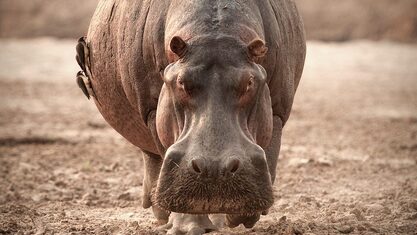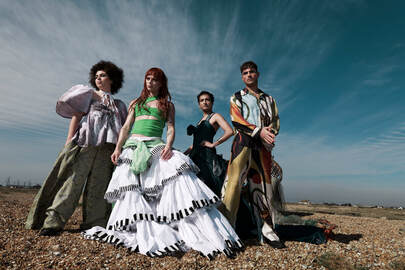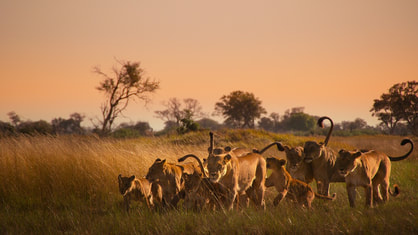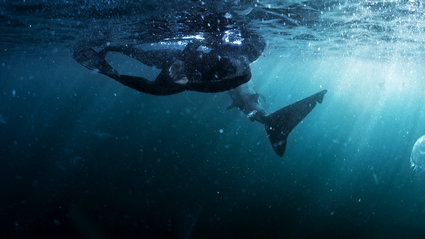For implementation of sustainable best practices to reduce the environmental impact through the entire lifecycle of a production.
Hippo King

Since June 2021, there has been a dedicated Green Producing subsection of the
Terra Mater Studios (TMS) corporate website, which can be found at:
www.terramater.com/factual-studios/green. This includes a mission statement and further information on the topics of emissions calculation, green producing and
reduction measures, which have also been communicated internally and are updated
regularly. The whole production process from Pre-Production to Post-Production is accompanied by an educated Green Consultant or another qualified person in consultation with Terra Mater Studios (TMS).
Before the production took place, Nina Holler, Sustainability Manager, Will and Lianne Steenkamp and producer Roman Landauer created a checklist for the film shooting based the requirements of the Austrian eco-label, which included:
● Communication
● Storytelling
● Mobility
● Location
● Production Office
● Equipment
● Food/Catering
● Accommodation
● Post Production
● Emission Calculation
Hippo King Green Production Strategy goes into further detail in each of these aspects of sustainable production.
Terra Mater Studios (TMS) corporate website, which can be found at:
www.terramater.com/factual-studios/green. This includes a mission statement and further information on the topics of emissions calculation, green producing and
reduction measures, which have also been communicated internally and are updated
regularly. The whole production process from Pre-Production to Post-Production is accompanied by an educated Green Consultant or another qualified person in consultation with Terra Mater Studios (TMS).
Before the production took place, Nina Holler, Sustainability Manager, Will and Lianne Steenkamp and producer Roman Landauer created a checklist for the film shooting based the requirements of the Austrian eco-label, which included:
● Communication
● Storytelling
● Mobility
● Location
● Production Office
● Equipment
● Food/Catering
● Accommodation
● Post Production
● Emission Calculation
Hippo King Green Production Strategy goes into further detail in each of these aspects of sustainable production.
Sea Our Future

Sea Our Future X Attitude explores LGBTQ+ identity; sustainability; climate change; our relationship with the ocean; environmental intersectionality and the future of our planet. Told through the lens for a sustainable fashion shoot and social media campaign given style and body image are a big part of the LGBTQ+ community and that fashion and consumer choice have a huge impact on environmental issues. Aiming to reach new, underrepresented audiences and to encourage engagement with systemic issues around ocean health. Whilst inspiring hope and encouraging stewardship for our ocean now and in the future. Sustainability was at the heart of the editorial and production process.
During production at Freeborne Impact we endeavored to make sustainable choices wherever possible. We chose vendors based on their green credentials across transport, kit and consumables and on the shoot itself did our best to limit our environmental footprint. All looks sourced by stylist Emily Evans were from sustainable designers, ethically made or from second hand sources. Where possible sustainable makeup and beauty products were used. We wanted the campaign to say it’s possible to look good with thought to the planet and to encourage our audience to think and talk about how their choices matter.
Instagram comment: “This is so inspiring! Thank you for being proud and having these conversations with other queer people - Bimini of all people - we can be who we are and not just make a difference to our community but to the world! #SeaOurFuture”.
@freeborneimpact
@attitudemag
@biminibabes
@danowild
@nogalevyrapoport
@wildheartwithacamera
@josephsinclair
@mrsemilyevans
During production at Freeborne Impact we endeavored to make sustainable choices wherever possible. We chose vendors based on their green credentials across transport, kit and consumables and on the shoot itself did our best to limit our environmental footprint. All looks sourced by stylist Emily Evans were from sustainable designers, ethically made or from second hand sources. Where possible sustainable makeup and beauty products were used. We wanted the campaign to say it’s possible to look good with thought to the planet and to encourage our audience to think and talk about how their choices matter.
Instagram comment: “This is so inspiring! Thank you for being proud and having these conversations with other queer people - Bimini of all people - we can be who we are and not just make a difference to our community but to the world! #SeaOurFuture”.
@freeborneimpact
@attitudemag
@biminibabes
@danowild
@nogalevyrapoport
@wildheartwithacamera
@josephsinclair
@mrsemilyevans
Surviving Paradise - A Family Tale

Making any natural history film is only possible so long as areas of wilderness exist. Today, these increasingly isolated corners of our planet are under countless threats from climate change to plastic pollution, habitat loss and deforestation. While it is the responsibility of our industry to shed light on these issues, it is also its responsibility to mitigate its impacts as much as possible while doing so.
The value of working with local companies who are based on location and who know the area better than anyone else is quickly being recognised as not just a cost-effective strategy, but one that is beneficial for the environment as well. For the making of Surviving Paradise: A Family Tale, Bristol-based Freeborne Media and Wildspace Productions collaborated with us here at the Botswana-based Natural History Film Unit, a citizen-owned company with local expertise in the Okavango Delta.
The goal of all of our films is to make people fall in love with the cast and their environment. Research (McCormack, Martin, and Williams, 2021) has shown that wildlife films and documentaries play a critical role in getting people to care about the environment and thus foster more environmentally friendly practices in their day to day life. What is also apparent to us at the Natural History Film Unit Botswana is the role that wildlife films play in tourism.
Tourists travel all over the world to see the internationally renowned ‘jewel of Botswana’. Of course, tourism has some detrimental environmental consequences (not least international flights), but in our opinion it is the main reason that Botswana’s Okavango Delta, one of the most pristine wetland environments left on this planet, is still around today and it is the justification to keep it around for the future generations to come. However, it would have been counterintuitive for us to have made this film and emitted any unnecessary pollution while doing so. This is why we couldn’t be prouder that across the board during the making of Surviving Paradise: A Family Tale, every effort was made to maintain as small an environmental footprint as possible.
References: McCormack, Martin, Williams, 2021, 'The full story: Understanding how films affect environmental change through the lens of narrative persuasion’, People and Nature. https://doi.org/10.1002/pan3.10259.
The value of working with local companies who are based on location and who know the area better than anyone else is quickly being recognised as not just a cost-effective strategy, but one that is beneficial for the environment as well. For the making of Surviving Paradise: A Family Tale, Bristol-based Freeborne Media and Wildspace Productions collaborated with us here at the Botswana-based Natural History Film Unit, a citizen-owned company with local expertise in the Okavango Delta.
The goal of all of our films is to make people fall in love with the cast and their environment. Research (McCormack, Martin, and Williams, 2021) has shown that wildlife films and documentaries play a critical role in getting people to care about the environment and thus foster more environmentally friendly practices in their day to day life. What is also apparent to us at the Natural History Film Unit Botswana is the role that wildlife films play in tourism.
Tourists travel all over the world to see the internationally renowned ‘jewel of Botswana’. Of course, tourism has some detrimental environmental consequences (not least international flights), but in our opinion it is the main reason that Botswana’s Okavango Delta, one of the most pristine wetland environments left on this planet, is still around today and it is the justification to keep it around for the future generations to come. However, it would have been counterintuitive for us to have made this film and emitted any unnecessary pollution while doing so. This is why we couldn’t be prouder that across the board during the making of Surviving Paradise: A Family Tale, every effort was made to maintain as small an environmental footprint as possible.
References: McCormack, Martin, Williams, 2021, 'The full story: Understanding how films affect environmental change through the lens of narrative persuasion’, People and Nature. https://doi.org/10.1002/pan3.10259.
Wild Isles

The goal with our latest feature 'Wild Isles' – and with all Newyonder Originals, is to tell stories that inspire, engage, inform and educate. In short, we give the planet, people and wildlife a voice through the power of story. Because it's through stories that people make sense of the world - and the greater we understand it, the more likely we are to preserve it. The way in which we produce and distribute those stories are just as important:
1) Newyonder is a certified B Corp, using "business as a force for good" - https://www.bcorporation.net/en-us/find-a-b-corp/company/newyonder
2) Newyonder Originals to date are all BAFTA/Alert-certified carbon-neutral sustainable productions - https://www.newyonder.earth/page/Impact
3) We invite our audience to go beyond the story and help drive real tangible change. Where they can stream Newyonder Originals on compatible devices, at any time, and help restore the planet from their own sofa – with at least 5% of the revenue going towards regenerative and sustainable impact projects, based on the films our streamers watch.
https://www.newyonder.earth/page/About
1) Newyonder is a certified B Corp, using "business as a force for good" - https://www.bcorporation.net/en-us/find-a-b-corp/company/newyonder
2) Newyonder Originals to date are all BAFTA/Alert-certified carbon-neutral sustainable productions - https://www.newyonder.earth/page/Impact
3) We invite our audience to go beyond the story and help drive real tangible change. Where they can stream Newyonder Originals on compatible devices, at any time, and help restore the planet from their own sofa – with at least 5% of the revenue going towards regenerative and sustainable impact projects, based on the films our streamers watch.
https://www.newyonder.earth/page/About
